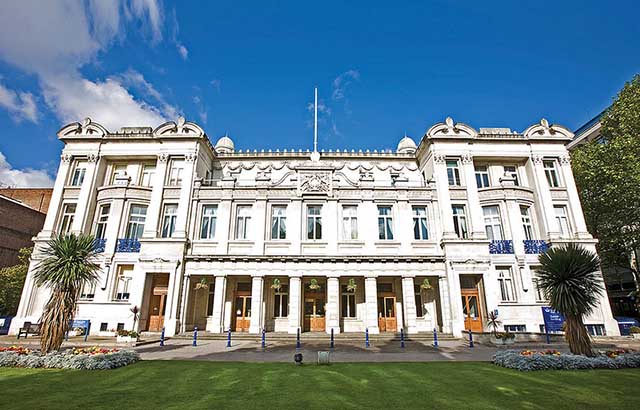The pandemic halted business as usual for universities, forcing a shift to remote learning almost overnight. Universities are working to recover from the financial blows that Covid-19 imposed on their institutions.
The Deloitte Centre for Higher Education [1] reports that the most immediate challenge for the majority of institutions involves cash flow. Universities have lost money due to:
- No income being generated from parking fees
- No income being generated from dining outlet fees
- Unexpected expenses created by the pandemic
- Administering refunds on fees
- Administering refunds on rooms and board
- A need to scale virtual engagement modalities
Deloitte explains that to ensure continuity in the short term, some institutions will likely need to rapidly restructure their operations.
Queen Mary University of London
Queen Mary University of London is 110th in the Global University Rankings. It employs a body of 2,060 academics and supports 415 Post Doc students, 1,900 PhD students, generating a research income of £153m [2].
Research England’s Knowledge Exchange Framework (KEF) aims to increase efficiency and effectiveness in the use of public funding for knowledge exchange and to foster a culture of continuous improvement in universities.

QMUL ranks in the top 10% for Public & Community Engagement, as measured by the KEF.
It is in the top 10% of universities when measuring the value of Research Partnerships, in the top 30% for Working with Businesses and in the top 30% for Working with the Public and Third Sectors.
How does the University work with Academics and Businesses to Build Relationships?
Dr Sharon Ellis is Director of Research, Enterprise and Partnerships and Interim Director of Infrastructure at Queen Mary University of London [2]. Sharon discussed the benefits of harbouring strong working relationships with academics and external businesses, with the aim of supporting income generation for the institution through collaboration and commercialisation.
Consultancy and contract research: The university works with Queen Mary researchers to add value to in-house capabilities or buy-in specialist knowledge and expertise. Partners include Yamaha and Huawei.
The benefits for partners are:
- Quick access to world-class facilities
- Access to research and technical expertise across Queen Mary University of London
Knowledge Transfer Partnerships: A three-way collaboration between business, university, and graduates. Partners include CrystalMaker Software and Zeixx.
The benefits for partners are:
- Embedding knowledge and training for staff
- Expected increase in turnover
- Scope to enter new markets
Innovate UK: Funds industry and research collaborations to accelerate product and technology innovation with companies. Partners include Helitune and Sugra.
The benefits for partners are:
- High quality research and knowledge exchange
- Potential for commercialisation of new products
- Expected increase in turnover
PhD Studentships: Industry and research collaborations to accelerate product and technology innovation. Partners include Spotify, Universal and Apple.
The benefits for partners are:
- High quality research and knowledge exchange
- Potential for the development and commercialisation of new products

What does the Institution look for when Recruiting Business Teams and Partnerships?
When the university is recruiting organisations and academics to participate in their growth plans, they look for certain soft and hard skills that will facilitate financial and cultural development within the institution.
Hard Skills:
- Commercial awareness and understanding of investor/industrial trends
- Deep technical understanding that aligns with the strengths of the university
- A balance between tenacity and tone when securing deals. This includes an understanding of risk, but also the need to be assertive
- For more senior team members, an experience of tech transfer and early-stage commercialisation; whether in university, industry or start-up
- In Junior or PhD roles there ought to be an understanding that research takes time and can be risky. Direct experience of research is essential
Soft Skills:
- Interpersonal skills including understanding and empathy. This is to ensure that collaborative and efficient working relationships are formed
- A good fit with the team
- Complimentary skills such as a deep understanding of building business and an eye for the legal elements of business
- A good eye for opportunity and development
Sharon really emphasised the need for a partner to be patient. Often the development of growth projects can be tedious. Planning, evaluation, funding applications and licensing can take a lot of time, sometimes even years.
Kinomica: A Spin-Out Company from Queen Mary University
Kinomica is a pioneering precision medicine research and diagnostics company specialising in cell signalling through machine learning that enables the discovery of new biomarkers.
Kinomica is privately held and was spun out of the Barts Cancer Institute at the Queen Mary University of London in 2016 to build on the work of Dr Pedro Cutillas and colleagues. Kinomica is based in Alderley Park, UK, with additional operations in London and Canada.
Kinomica works with a range of very well-known customers that offer pharma services, clinical research, and clinical services. The companies provide Kinomica with additional funding to help develop ideas that are of interest to them. These customers include:

- AstraZeneca
- Eli Lilly
- Novartis
- Medigene
Kinomica has recently raised £3.9 million and has a predicted valuation by 2025 of £25 – £30 million. Additionally, they won the Best Investment Deal of the Year 2021 at the Bionow Digital Awards.
Enterika: A Spin-Out Company from Queen Mary University
Enterika is another spin-out company from Queen Mary University. It is yet to be launched, however, there are plans to launch the product in the next two years.
The company has developed an appetite suppressant that consists of a combination of nutrients that are delivered to the colon, to cause a boost of the satiety hormone.
Queen Mary University has facilitated the development of the brand and it has since been featured on Channel 4 “How to Beat…Fat” as well as the Daily Telegraph and the Daily Mail.
Phase 1 trials have produced positive data, showing a 16% weight loss on average, this could take a clinically obese individual of BMI ~ 30 to a safer health index.
They aim to raise a further £1.5 million to support Phase 2 trials.
Both Kinomica and Enterika are great examples of innovative and pioneering work that can be born through institutional, academic, and business collaborations.
The projects give steam to the university to attract further collaboration projects that will continue to generate income for years to come.
[1] The Deloitte Centre for Higher Education. 2020. COVID-19’s impact on higher education: Strategies for tackling the financial challenges facing colleges and universities
[2] Ellis, Sharon. 2021. Director of Research, Enterprise and Partnerships and Interim Director of Infrastructure at Queen Mary University of London
Register FREE to access 2 more articles
We hope you’ve enjoyed your first article on GE Insights. To access 2 more articles for free, register now to join the Government Events community.
(Use discount code CPWR50)




